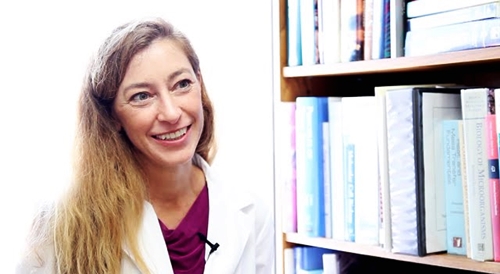21 October 2015. A protein engineering lab at University of Texas in Austin is evaluating the potential of an engineered antibody to prevent pertussis, also known as whooping cough, among newborn infants. The study and lab are led by chemical engineering professor Jennifer Maynard, who is testing the antibody under a $400,000 grant from the Bill & Melinda Gates Foundation.
Pertussis is a highly contagious bacterial infection of the respiratory tract that affects primarily children, and results in a severe hacking cough, followed by high-pitched breathing that sounds like a “whoop.” The number of pertussis cases is growing in the U.S. due to parents delaying or avoiding vaccinations for their children, and particularly in low-resource countries where many families do not have access to vaccines. Centers for Disease Control and Prevention estimates 16 million cases of pertussis occur each year, resulting in some 195,000 deaths worldwide.
Maynard and colleagues conducted the initial research leading to the discovery of two engineered antibodies for the treatment of pertussis. Unlike antibiotics that target the bacteria causing the infection, the Texas antibodies aim to neutralize the toxins caused by the infection that result in the severe coughing symptoms. Synthetic Biologics, a biotechnology company in Rockville, Maryland licensed Maynard’s technology and is developing a treatment for pertussis, code-named SYN-005, based on those two antibodies.
The grant from the Gates Foundation funds a study by Maynard of a component of SYN-005, known as hu1B7. One of the Gates Foundation goals is to increase access of underserved populations to vaccines, including those preventing pertussis. This study would generate preclinical proof-of-concept data evaluating hu1B7’s potential as a vaccine against pertussis given to newborn infants, providing protection against the disease in the first four months of life, when babies are most vulnerable to the disease.
As reported by Science & Enterprise in August, Synthetic Biologics is collaborating with another biotech enterprise Intrexon, in Gaithersburg, Maryland to design drug candidates from Intrexon’s ActoBiotics platform that develops biologic therapies from engineered microbes commonly used to produce yogurt and cheese. Synthetic Biologics says SYN-005 is a product of that collaboration.
Read more:
- Institute, GlaxoSmithKline ID Tuberculosis Candidates
- Influenza A Therapy Shown Working in Trial
- Engineered Viruses Harnessed to Fight Bacteria
- Virus Particles Rebuilt to Boost Immunotherapies
- Research Group, CureVac Partner on AIDS Vaccine
* * *


 RSS - Posts
RSS - Posts
You must be logged in to post a comment.